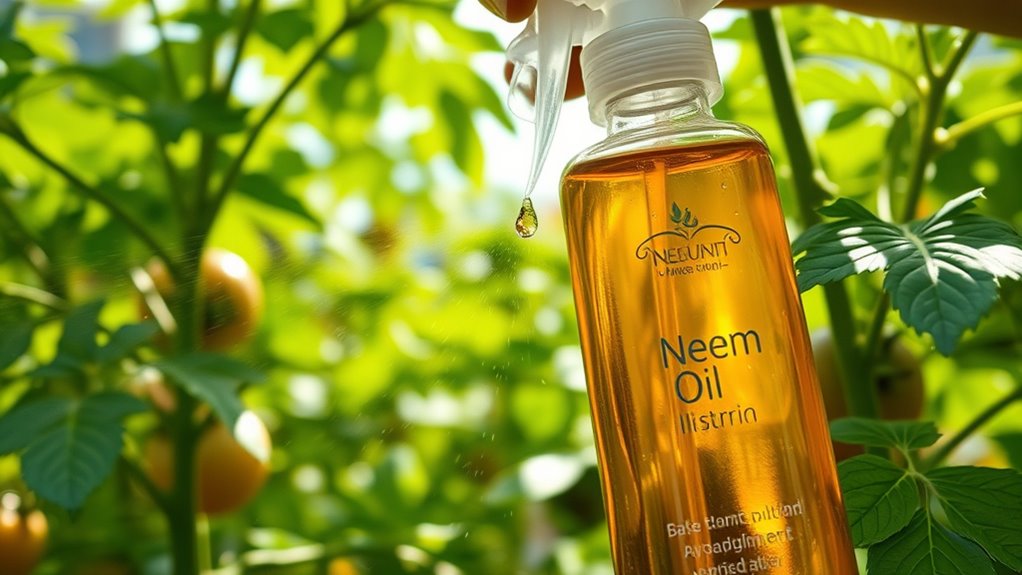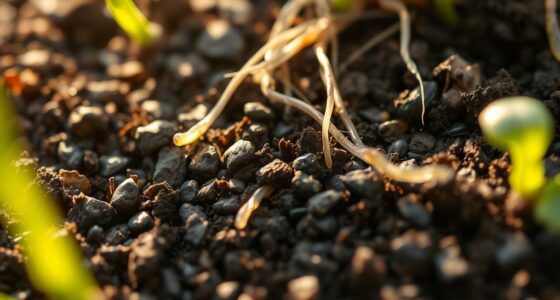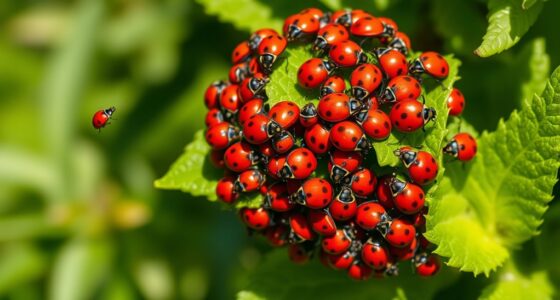To safely use neem oil on your plants, start by reading the label carefully. Dilute it with water and add a few drops of mild soap as an emulsifier. Spray on both sides of leaves early in the morning or late in the evening to prevent leaf burn, and wear gloves for protection. Keep pets and children away until it dries. For more tips on proper application and safety, continue exploring how to maximize this natural pest control method.
Key Takeaways
- Always dilute neem oil with water and add a mild soap as an emulsifier before spraying on plants.
- Spray both the upper and lower leaf surfaces for effective pest control.
- Apply early morning or late evening to prevent leaf burn and maximize safety.
- Wear gloves and avoid inhaling spray; keep pets and children away until it dries.
- Repeat application every 7 to 14 days for sustained pest management and plant health.

Have you ever wondered how a simple natural oil can transform your garden and pest management routine? Neem oil is a versatile tool that fits perfectly into your organic gardening toolkit. It’s derived from the neem tree and has been used for centuries to control pests naturally. When applied correctly, neem oil offers effective pest control without the harsh chemicals found in many commercial pesticides. This makes it a popular choice for gardeners committed to sustainable practices and maintaining the health of their plants and soil.
Using neem oil in your pest control strategy is straightforward, but it’s essential to understand how to do it safely. First, always read the label thoroughly before application. Neem oil works best when diluted properly—typically, a few teaspoons of neem oil mixed with a quart of water and a few drops of mild soap serve as a good starting point. The soap acts as an emulsifier, helping the oil mix evenly with water. Spray this mixture on affected plants, making sure to cover both the upper and lower surfaces of leaves where pests often hide. Consistency is key; repeat applications every 7 to 14 days to keep pests at bay.
One of the main benefits of neem oil is its dual action: it disrupts pest feeding and inhibits their reproductive cycle, reducing populations over time. It’s especially effective against soft-bodied insects like aphids, whiteflies, and spider mites. Plus, neem oil is safe for beneficial insects such as bees and ladybugs when used properly, making it ideal for organic gardening. However, avoid applying neem oil during the hottest part of the day or when the sun is intense, as it can cause leaf burn or stress plants. Early morning or late evening sprays are ideal.
Safety is paramount when using neem oil, even though it’s natural. Always wear gloves and avoid inhaling the spray. Keep pets and children away during and after application until the spray dries completely. If you notice any adverse reaction on your plants, rinse the affected area with water and discontinue use temporarily. Neem oil is biodegradable, so it won’t linger in the environment, but proper application ensures it’s effective without harming your garden’s ecosystem. Additionally, understanding the role of contrast ratio in your garden’s lighting setup can help optimize the visual health of your plants and their overall growth environment.
Incorporating neem oil into your pest control routine enhances your ability to maintain a healthy, thriving garden organically. It’s a safe, effective, and environmentally friendly option that respects the delicate balance of nature while protecting your plants from common pests. With a little knowledge and care, you can harness the power of neem oil to keep your garden vibrant and pest-free, all while staying committed to organic gardening principles.
Frequently Asked Questions
Can Neem Oil Be Used on Edible Plants Safely?
You can use neem oil on edible plants safely if you consider neem oil toxicity and plant compatibility. Always choose cold-pressed, pure neem oil and follow recommended application rates. Apply it during early morning or late evening to minimize leaf burn and avoid spraying on flowers or edible parts close to harvest time. Properly diluted, neem oil is effective against pests while remaining safe for your plants and your health.
How Long Does Neem Oil Residual Effect Last?
Imagine your garden as a delicate dance floor, where neem oil’s residual duration acts like a gentle spotlight lingering after the music stops. Typically, neem oil’s residual effect lasts about 7 to 14 days, depending on weather and application strength. Its environmental impact diminishes over time, making it a safer choice for eco-conscious gardeners. Keep monitoring your plants, and reapply as needed to maintain that healthy, vibrant rhythm.
Is Neem Oil Safe for Beneficial Insects?
You wonder if neem oil is safe for beneficial insects. Generally, neem oil is effective for pest control, but it can harm beneficial insects if applied directly or during active hours. To protect these helpful insects, you should apply neem oil early in the morning or late in the evening when beneficial insects are less active. This way, you support pest control without disrupting your ecosystem.
Can Neem Oil Cause Plant Phytotoxicity?
Did you know that improper use of neem oil can cause phytotoxicity in 5-10% of treated plants? Yes, at high concentration levels or if you apply it during the heat of the day, your plants might develop leaf burn or damage. To prevent this, always check the recommended concentration levels and apply neem oil early in the morning or late afternoon when temperatures are cooler. Proper timing protects your plants and ensures effective pest control.
What Are the Signs of Neem Oil Overuse?
If you overuse neem oil, you’ll notice signs like leaf spotting, yellowing, or leaf drop, indicating damage from excessive application. Too frequent use can lead to pest resistance, making pests less responsive over time. To avoid this, limit application frequency and monitor your plants closely. Proper use guarantees neem oil remains effective without harming your plants, keeping them healthy and protected from pests.
Conclusion
Now that you know how to wield neem oil like a botanical superhero, your plants are unstoppable! With just a few simple steps, you’ll turn your garden into an impenetrable fortress against pests and diseases—no villain can stand against your green thumb. So, go ahead, deploy the power of neem oil, and watch your plants thrive like they’ve never thrived before. Your garden’s about to become the envy of the entire neighborhood!









